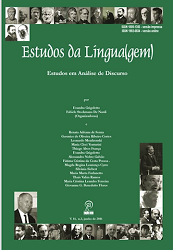Beyond rituals and customs: what can we say about the notion of culture in discourse analysis?
DOI:
https://doi.org/10.22481/el.v14i2.1319Keywords:
Culture, Ideology, Unconscious, Sense, InterpellationAbstract
This paper aims attention at the relationship among the notions of ideology, unconscious and culture. It is intended to take a step towards the correlation among these notions in order to realize the marks that refer to the porosity and opacity of the practices and rituals that are part of a culture and that are also present in the process of the interpellation of the subject, producing illusions that place the subject in the center and as the origin of what they say. In this sense, we are interested in thinking over the possible interpellation of the subject by the culture, which related to ideology works naturalizing senses, creating effects of evidence and truth.
KEYWORDS: Culture. Ideology. Unconscious. Sense. Interpellation.
Downloads
References
AUTHIER-REVUZ, J. Heterogeneidade(s) Enunciativa(s). Cad. Est. Ling. No 19, Campinas, SP, p. 25-42, jul./dez. 1990.
CARVALHO, J. M. O motivo edênico no imaginário social brasileiro. In: RBCS. V. 13, n. 38, p. 63-79, 1998.
CORACINI. M. J. Língua estrangeira e língua materna: uma questão de sujeito e identidade. In: _____. (Org.). Identidade e discurso: (des)construindo subjetividades. Campinas: Editora da UNICAMP; Chapecó: Argos Editora Universitária, 2003. p. 139-195.
ESTEVES, P. M. S. O que se pode e se deve comer: uma leitura discursiva sobre o sujeito e alimentação nas enciclopédias brasileiras. Tese (doutorado em Linguística). Instituto de Letras da Universidade Federal Fluminense, 2014.
FERREIRA, M. L. F. O discurso do corpo. In MITTMANN, Solange; SANSERVERINO, Antônio Marcos (Org.). Trilhas da investigação: a pesquisa no I.L. em sua diversidade constitutiva. Porto Alegre, RS: Instituto de Letras/UFRGS, 2011. p. 89 – 105.
_____. Análise do discurso e suas interfaces: o lugar do sujeito na trama do discurso. Organon, Porto Alegre, v. 24. n. 48, p. 17-34, 2010.
_____. Da ambiguidade ao equívoco: a resistência da língua nos limites da sintaxe e do discurso. Porto Alegre, RS: Ed. Universidade/UFRGS, 2000.
FREUD, S. O estranho. In: _____. Obras Completas. Rio de Janeiro: Edição Standard Brasileira, 1976, p. 271-318.
LARAIA, R. B. Cultura: um conceito antropológico. 14a ed. Rio de Janeiro, RJ: Jorge Zahar, 2001.
MARIANI, B. S. C. Sujeito e discurso contemporâneos. In: In: INDURSKY, F.; LEANDRO- -FERREIRA, M.C.; MITTMANN, S. (Org.). O discurso na contemporaneidade: materialidades e fronteiras. São Carlos: Editora Claraluz, 2009. p. 43-53.
PÊCHEUX, M. O Discurso: estrutura ou acontecimento. 6a ed. Campinas, SP: Pontes, 2012. Edição original: 1983.
_____. Semântica e discurso: uma crítica à afirmação do óbvio. Tradução de Eni Orlandi et al. 4.ed. Campinas: Editora da UNICAMP, 2009. Edição Original: 1975.
REVUZ, C. A língua estrangeira entre o desejo de um outro lugar e o risco do exílio. In: Língua(gem) e identidade. Campinas, SP: Mercado das Letras, 2006. p. 213-230.
SANTOS, J. L. O que é cultura. 16a ed. São Paulo/SP: Ed brasiliense, 2010.
Downloads
Published
How to Cite
Issue
Section
License

Estudos da Língua(gem) is licensed under a Creative Commons Attribution 4.0 International License.
Authors who publish in the journal Estudos da Língua (gem) agree with the following terms:
The journal Estudos de Língua(gem) maintains the copyrights of the contributions published. These rights include the publication of the contribution and make its content available for free through the portal.







